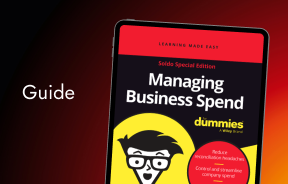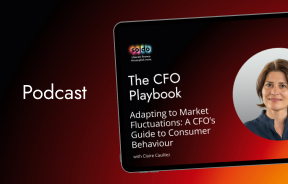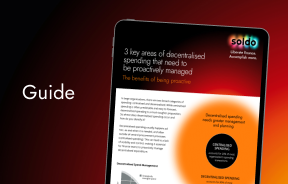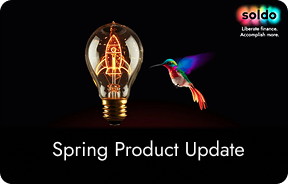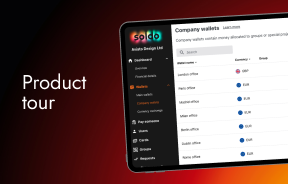Episode 37: Imply | With Tony Russo, CFO
Tony Russo took the helm as CFO at Imply in August of 2020 after having been a CFO or dual COO/CFO at over 10 companies in the last 25 years. With multiple successful M&A transactions under his belt, Tony takes a measured and strategic approach to evaluating opportunities, whether with the goal of benefitting the companies he works for or in determining which challenges to take on as a CFO.
While assessing risk, upside, and diligence capabilities are all vital components of determining whether a new CFO opportunity is the right fit, Tony stresses the importance of making sure your values are aligned with the mission of the company and the executive team above all else. Believing in the company and getting along with your team go a long way in driving future success. For this reason, Tony also recommends prioritizing values and attitude when hiring for the finance team.
Though the right team members are key, Tony prefers to keep finance lean as the company scales. One way he accomplishes this is by leaning on technology to make a team more efficient rather than increasing headcount. It’s a delicate balance and Tony believes a good CFO keeps an eye on operations to know when new technology isn’t enough to manage workload and drive insights.
Another balance Tony strikes is between speed and discipline. For this reason, he doesn’t approve expenses without a plan in place and he shows restraint in focusing on three priorities a quarter.
On this episode of The CFO Playbook, Tony shares why company values play a pivotal role in evaluating new opportunities, emphasizes the importance of finance staying lean, and describes why operational discipline is so critical for success.
Guest Analysis
Name: Tony Russo
What he does: Tony Russo is the CFO of Imply, a full stack, multi-cloud data platform pioneering ‘analytics-in-motion.’ With a successful track record scaling B2B SaaS and enterprise software companies through organic growth and acquisitions, Tony has a wealth of knowledge about evaluating opportunities as a CFO.
Key Quote: “I basically won’t join a company, even if it could be a fantastic outcome, if I’m not aligned with the values. I’ve got to believe in the mission and the culture and the ethos.”
Where to find Tony: LinkedIn
From Tony’s Playbook
Operational discipline is critical to success
Tony recognizes that discipline is a challenge at every company that is growing quickly. He stresses that as CFO, you have to be able to balance speed with discipline in order to maintain sustainable growth. One area that poor discipline comes up again and again is in spending. In fact, when Tony is evaluating whether a company is a fit for him, a lack of structure and a plan that backs up spending is a big red flag.
Know when to leverage technology vs. raising headcount
When the finance department is overwhelmed, it can be tempting to solve the problem by increasing headcount. Tony favors a lean and nimble finance team as a business is scaling and emphasizes the importance of understanding what technologies are out there to apply to FP&A, accounting, and HR. The right technology means fewer spreadsheets and more headspace for critical thinking. Of course, it’s not always an either/or. As CFO, you should know when the timing is right to implement an automation solution or to increase headcount.
Value alignment is key
Whether Tony is evaluating a CFO opportunity at a new company or recruiting for his finance team, he underlines value alignment as the most important factor. As he says, “life is too short to work with people you don’t want to work with.” But it goes a step further still: believing in the mission, culture, and ethos of a company means you will do more meaningful work to help drive a successful outcome.
A great CFO balances EQ and financial know-how
When you’re in the role of CFO, Tony says that you’re acting as a strategic advisor to the whole team. Which means that you’re in a position where you need to get along with a lot of different people in the company. At the same time, Tony says that you also have to have the discipline to hold the line and deliver hard messages. Because of that, your EQ is as important as your hard FP&A skills. Cultivating authentic relationships across teams helps build the foundation that enables towing the line when it’s time to think operationally.
Episode Highlights
Evaluate exit opportunities early
“When I come into a company, I always think about what’s it going to look like? Are we going to be ready to sell or IPO? So I try to start instrumenting things with that in mind from the beginning and develop a two to three-year plan to get there. And sometimes it happens sooner. but having that in mind is good.”
The CFO as strategic advisor
“The CFO role is interesting. And one of the things I like about it is very much a strategic advisor to the whole team. So because of that, you’re in this position where… you really do want to try to get along with everyone and work well with everyone. But at the same time, you have to deliver hard messages sometimes, and you got to hold the line and then you got to learn to resolve that.”
Align your priorities with the CEO
“The most important relationship for me is with the CEO. Basically we’ll work with her or him to figure out what should my priorities be, because there’s always too much to do. So prioritization is so important. Aligning with her or him on those priorities is a necessary first start to this to figure out where [I should] be spending my time.”
Back up expenses with a plan
“I just will flat out not approve…expenses or head count without a plan. If we’re thinking about expanding somewhere…one-offs don’t work. What’s the plan? You can tell if there’s discipline or not and what is encouraged or not, and how are they spending money, right? You can see that. And so that’s actually one of the more concrete ways for me to say, ‘yeah, this is probably not the right place for me to come in’ because I’m a big believer in discipline or structure.”
Share the right information with your board
“It’s very important to understand the right level of information to give your board in board meetings…I was guilty of this too. You just want to give them everything right? The 20 page supplemental deck and all the statistics to evidence, ‘oh, I’ve got my act together.’ But what you really need to do is figure out is what they do want to see. And what I’ve seen work really well is a one page tear sheet of the most important metrics. So if they saw one slide, it’s this, and they got the idea of the financial state of the business, and then a couple of slides on operational stuff and your departments or what your priorities are current quarter and last.”
Top quotes:
“It’s good to find work for a good CFO, as opposed to get the title early by joining a really early stage company because you think you need to have the title. I would go work for a great CFO first as a person to learn from.”
“I tend to look at the opportunities along kind of a risk spectrum… So where is the risk in the business? Is it product market fit? Is it market size? Is it financing risk, capital? Is it execution risk? That’s the best kind of risk. Is it cultural risk?”
“When we’re recruiting, we’re recruiting not only for. ability, but also for values and attitude.”
“I believe life is too short to work with people you don’t want to work with. And so we make sure that everybody on the team is aligned and sometimes you inherit folks that are, that are not and you can have conversations respectful in private and and see where it goes.”
“I think now it’s more and more incumbent upon us to understand what technologies out there that we can apply to, to, to FP&A, or accounting or HR. So it’s not just throw bodies, That’s the more costly way to do it. But I think… where I am right now is it’s probably a combination of the two. I think we need to hire some more folks right now, but then we also need to think about what software can we implement over the next 12 months that might help with raising our awareness without cranking so many spreadsheets.”
“I think the key [in managing the diligence process] is making sure you have really, really good people around you and at the company that will do well in diligence, both their presenting, but also supporting us in finance, pulling together the information we need for diligence. So having a really great legal resource is key. Really great HR is key. Really great sales ops is key. You’re never going to have everything. The repository’s never going to be perfectly ready. Every request list is different, but if you’re 80% there or 70%, even then… getting it over the line If you have the right people and the right process can be time-consuming but less painful.”









